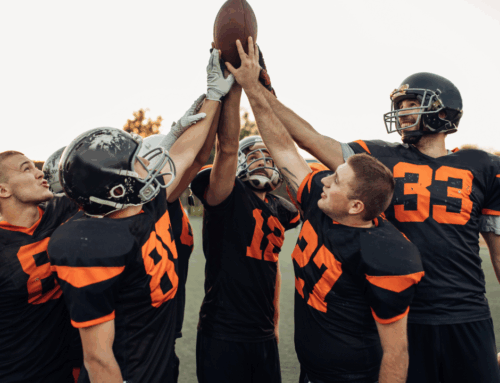Get our exclusive report. Download the iSport360 Club Switching Report Here – For Club Admins, Rec Leaders and Coaches.
Why College Athletes Struggle With Depression And Anxiety
College athletics and college athletes are often portrayed as the pinnacle of physical strength, discipline, and resilience.
However, behind the glory and glamour of the field, many college athletes face a hidden struggle with their mental health. The pressure to perform at their best, maintain good grades, and balance a rigorous training schedule can take a toll on their mental well-being.
Studies have shown that college athletes are at a higher risk for depression, anxiety, and other mental health disorders compared to their non-athlete peers. This link between college athletics and mental health is often overlooked and under-discussed.
As a highly skilled assistant specializing in digital marketing, I understand the importance of raising awareness on this topic and providing valuable insights for those affected.
Through this article, we will explore the hidden struggle of college athletes’ mental health and provide tips on how to support and prioritize mental well-being in the world of college athletics.
The Prevalence Of Mental Health Issues Among College Athletes
According to a recent survey by the NCAA, approximately 30% of college athletes have reported experiencing symptoms of depression.
Another study found that 80% of college athletes experience high levels of stress, with more than one-third of them reported feeling overwhelmed. These statistics underscore the prevalence of mental health issues among college athletes.
The pressure to perform at a high level, maintain good grades, and balance a rigorous training schedule can be overwhelming for many college athletes.
Unlike their non-athlete peers, college athletes have additional stressors that come with their sport, such as the pressure to win games and the scrutiny of coaches, fans, and the media. This can lead to feelings of isolation, anxiety, and depression.
It’s essential to recognize that the prevalence of mental health issues among college athletes is not a sign of weakness or a personal failing. It’s a natural result of the unique set of stressors and pressures that come with being a college athlete.
The Unique Stressors And Pressures Faced By College Athletes
College athletes face a unique set of stressors and pressures that can be challenging to manage. For example, athletes must balance their academic workload, training, and competition schedules.
They must also deal with the physical demands of their sport, such as injuries and recovery time. Furthermore, they must navigate the expectations and demands of coaches, teammates, fans, and the media.
The unique stressors and pressures faced by college athletes can lead to a range of mental health issues, including depression, anxiety, and eating disorders. These issues can be exacerbated by the lack of support and resources available to athletes.
It’s essential to recognize the unique stressors and pressures faced by college athletes to provide them with the support and resources they need to manage their mental health effectively.
The Impact Of Mental Health On Athletic Performance
Mental health issues can have a significant impact on athletic performance. For example, depression can lead to a lack of motivation, decreased energy levels, and difficulty concentrating, all of which can affect an athlete’s ability to perform at their best. Anxiety can lead to physical symptoms such as increased heart rate and sweating, which can lead to decreased performance levels.
Furthermore, mental health issues can lead to a decrease in overall well-being, which can affect an athlete’s ability to maintain their training schedule, recover from injuries, and compete effectively.
It’s essential to recognize the impact of mental health on athletic performance and provide athletes with the support and resources they need to manage their mental health effectively.
Causes Of Anxiety In College Athletes
Sport and health science researchers have identified several potential causes of anxiety in college athletes. Student athletes may experience anxiety due to a variety of reasons. Mental health concerns can be caused by performance pressure, fear of failure or injury, academic expectations, and lack of support.
Pressure From Coaches And Peers
College athletics is a highly competitive environment with high expectations from both coaches and teammates. This pressure can cause athletes to feel overwhelmed and inadequate if they don’t hit the mark.
The National College Health Assessment survey found that nearly 75% of college athletes felt pressure to perform athletically from their coaches or teammates.
Lack Of Sleep
The physical health of college student athletes can also play a role in their mental health. Lack of sleep is a major factor that can lead to feelings of anxiety and depression.
Intense physical exertion makes it difficult for athletes to get enough restorative sleep each night. Sleep deprivation has been linked to an increase in mood disturbances, including depression or anxiety.
Fear Of Failure
College athletes often have large audiences watching their every move, and the fear of disappointing them can be a major source of stress. The pressure to succeed can lead to feelings of inadequacy or decreased self-confidence if an athlete doesn’t perform as expected.
Feeling Isolated
Student athlete mental wellness also suffers when athletes feel isolated from their peers. It’s common for college athletes to feel emotionally detached from their peers due to their intense commitment to their sport, leading to feelings of isolation and loneliness.
Strategies For Supporting Mental Well-Being In College Athletics
Former college athletes, administrators, and coaches are recognizing the need for more mental health resources in college athletics. There are several strategies that college athletes can use to support their mental well-being. These strategies include:
- Prioritizing self-care: Athletes should prioritize self-care activities such as getting enough sleep, eating a balanced diet, and engaging in stress-reducing activities such as yoga or meditation.
- Building a support network: Athletes should build a support network of friends, family, and teammates who can provide emotional support and encouragement.
- Seeking professional help: Athletes should seek professional help from a mental health therapist or counselor when needed.
- Developing coping skills: Athletes should develop coping skills such as positive self-talk, mindfulness, and deep-breathing techniques to manage stress and anxiety.
- Creating a balance: Athletes should create a balance between their academic, athletic, and personal lives to avoid burnout and stress.
These strategies can help athletes manage their mental health effectively and maintain their overall well-being.
The Role Of Coaches And Athletic Departments In Promoting Mental Health Awareness
Coaches and athletic departments play a crucial role in promoting mental health awareness among college athletes. Coaches should be aware of the unique stressors and pressures faced by athletes and provide support and resources to help them manage their mental health effectively.
Athletic departments should also provide education and training to coaches and staff on how to recognize and respond to mental health issues among athletes.
Furthermore, coaches and athletic departments should work to break down the stigma surrounding mental health issues in college athletics. By creating a culture of openness and support, athletes will feel more comfortable seeking help when needed.
The Importance Of Breaking The Stigma Surrounding Mental Health For College Athletes
The stigma surrounding mental health issues in college students can prevent athletes from seeking the help they need. This can lead to a cycle of negative outcomes, including decreased performance, increased stress, and decreased overall well-being.
It’s essential to break the stigma surrounding mental health issues in college athletics and create a culture of openness and support. By doing so, athletes will feel more comfortable seeking help when needed, ultimately leading to improved mental health outcomes.
Promoting A Culture Of Mental Health And Well-Being In College Athletics
Retired student athletes, coaches, and athletic departments all have a role to play in promoting a culture of mental health and well-being in athletics.
Promoting a culture of mental health and well-being in college athletics requires a collective effort from coaches, athletic departments, athletes, and the broader community. It involves creating a supportive environment that prioritizes mental health and well-being and provides the resources and support necessary for athletes to manage their mental health effectively.
By promoting a culture of mental health and well-being in college athletics, we can help athletes thrive both on and off the field.
Conclusion
In conclusion, the link between college athletics and mental health is a hidden struggle that often goes overlooked and under-discussed. College athletes face unique stressors and pressures that can take a toll on their mental well-being, leading to a range of mental health issues.
To support and prioritize mental health in athletics, we must recognize the prevalence of mental health issues among college athletes, provide them with the support and resources they need to manage their mental health effectively, and create a culture of mental health and well-being in college athletics.
As a community, we must work together to break down the stigma surrounding mental health issues. We need to prioritize the mental well-being of our college athletes. By doing so, we can help athletes thrive both on and off the field, ultimately leading to improved mental health outcomes and overall well-being.
Resources For College Athletes Seeking Mental Health Support
There are several resources available for college athletes seeking mental health support. These resources include:
- Campus counseling centers: Many colleges and universities have counseling centers that provide mental health services to students, including athletes.
- National Alliance on Mental Illness (NAMI): NAMI is a national organization that provides resources and support for individuals with mental health issues.
- National Institute of Mental Health (NIMH): NIMH is a federal agency that provides research and resources on mental health issues.
- NCAA Mental Health Resources: The NCAA provides mental health resources and support for college athletes.
- National Collegiate Athletic Association (NCAA) Sport Science Institute: The NCAA Sport Science Institute provides resources and research on how to improve the health and well-being of college athletes.
These resources can provide the support and resources they need to manage their student athlete mental health effectively.
For more from iSport360, click here.
Learn more or request a demo of our youth sports software that is helping teams improve communication, organization and player development.
March 20, 2023





